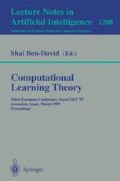Abstract
In this paper we study learning algorithms for environments which are changing over time. Unlike most previous work, we are interested in the case where the changes might be rapid but their “direction” is relatively constant. We model this type of change by assuming that the target distribution is changing continuously at a constant rate from one extreme distribution to another. We show in this case how to use a simple weighting scheme to estimate the error of an hypothesis, and using this estimate, to minimize the error of the prediction.
This research was supported in part by The Israel Science Foundation administered by The Israel Academy of Science and Humanities.
Preview
Unable to display preview. Download preview PDF.
References
Bartlett. Learning with slowly changing distribution. In Proceedings of the Workshop on Computational Learning Theory, Morgan Kaufmann Publishers, pages 243–252, 1992.
Peter Bartlett, Shai Ben-David, and Sanjeev Kulkarni. Learning changing concepts by exploiting the structure of change. In Proceedings of the Workshop on Computational Learning Theory, Morgan Kaufmann Publishers, 1996.
Rakesh D. Barve and Philip M. Long. On the complexity of learning from drifting distributions. In Proceedings of the Workshop on Computational Learning Theory, Morgan Kaufmann Publishers, 1996.
David Haussler. Decision theoretic generalization of the pac model for neural net and other learning applications. Information and Computation, 100:78–150, 1992.
David Helmbold and Phill Long. Tracking drifting concepts by minimizing disagreements. Machine Learning, 14(1):27–46, 1994. A preliminary version appeared in Proceedings of COLT 1991, 13–23.
David Pollard. Convergence of Stochastic Processes. Springer-Verlag, 1984.
Leslie G. Valiant. A theory of the learnable. Communications of the ACM, 27(11):1134–1142, November 1984.
V. N. Vapnik. Estimation of Dependences Based on Empirical Data. Springer-Verlag, New York, 1982.
Author information
Authors and Affiliations
Editor information
Rights and permissions
Copyright information
© 1997 Springer-Verlag Berlin Heidelberg
About this paper
Cite this paper
Freund, Y., Mansour, Y. (1997). Learning under persistent drift. In: Ben-David, S. (eds) Computational Learning Theory. EuroCOLT 1997. Lecture Notes in Computer Science, vol 1208. Springer, Berlin, Heidelberg. https://doi.org/10.1007/3-540-62685-9_10
Download citation
DOI: https://doi.org/10.1007/3-540-62685-9_10
Published:
Publisher Name: Springer, Berlin, Heidelberg
Print ISBN: 978-3-540-62685-5
Online ISBN: 978-3-540-68431-2
eBook Packages: Springer Book Archive

